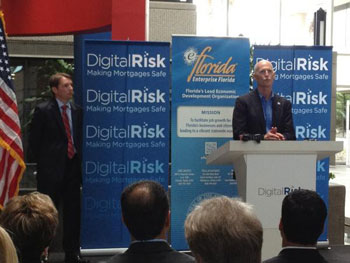
(Photo Stock.xchng.)
By Steve Miller
Florida Center for Investigative Reporting
It is, by any number of measures, a beautiful building.
Media Partners |
Located on eight acres in Fort Myers, the Florida office of technology research giant Gartner Inc. is 125,000 square feet of modern corporate campus, with a cafeteria large enough to feed 200 at a time, a gym and second-floor outdoor patio. It houses just over 10 percent of the multinational company’s 4,500 staffers.
Gartner’s technology services and consulting operation grew up in Florida, setting down in Lee County in 1998 with a state tax break worth $1.4 million and a promise to hire 335 people for the service center.
The move worked, if you measure success by the number of jobs created. Today, Gartner employs 500 people in Fort Myers.
“We’ve had great success in Florida,” said Christopher Lafond, Gartner’s chief financial officer. “We were looking to expand a few years ago and started talking to Lee County and the state, and our plan was to add a significant number of jobs. And both the county and the state told us of these programs.”
These programs were incentives. Florida was already doing business with Gartner, and to sweeten the deal for the company to build a new office in Lee County, the state gave Gartner economic incentive grants — $6 million as part of an agreement in which Gartner promised to create 800 more jobs and invest $18.2 million of its own money in Florida.
Incentives are the bedrock of Gov. Rick Scott’s economic policy agenda. Scott’s administration awarded more than $130 million in economic incentives in 2011 and 2012. Scott’s predecessors, Charlie Crist and Jeb Bush, shared the same enthusiasm for incentives.
To date, Gartner has received $1.9 million of that $3.2 million in incentive money and has created 289 jobs.
Headquartered in Stamford, Conn., Gartner also has a two-year contract for $156,146 with the state for technology consulting services.

Peter Sondergaard, head of Research for Gartner Inc., discussed technology spending on Bloomberg TV. Sondergaard’s company has received $6 million in economic incentives in Florida. (Photo courtesy of Gartner Inc.)
Combining the incentives with the state contract gives Gartner the resources to help the company meet those job creation goals.
With both economic incentives and state contracts, Gartner is an example of how big business is done in the Sunshine State.
Through economic incentives and state contracts, the state of Florida every year chooses winners in a selection process that open government advocates criticize as too secretive.
The incentives come in the form of grants, tax breaks, low-interest loans and training reimbursements. Enterprise Florida, a public-private partnership, recommends to the state companies it believes should receive economic incentives. Some of Enterprise Florida’s board members own companies that benefit from the very incentives they approve.
Yet incentives are the only beginning of how state money flows to the bank accounts of corporate America.
Gartner isn’t alone in receiving both state economic incentives and state contracts. Target, Publix, Lowe’s and other corporate giants have been contractors for dozens of state agencies, earning millions while also receiving millions more in economic incentives, such as work training grants and tax breaks.
Financial firm T. Rowe Price, one of the state’s employee retirement system providers, has received both incentives and state contracts.
According to a review of state data by the Florida Center for Investigative Reporting, 25 companies have received substantial state contractor payments and economic incentives in Florida.
“This is more proof that Enterprise Florida is picking winners, and most small businesses cannot imagine being successful in securing these awards,” said Dan Krassner, executive director of the Tallahassee-based watchdog group Integrity Florida. “The whole incentives strategy needs further review to see if it is truly in the public interest.”
State Money, Big Business
Gartner’s work in Florida and its recent expansion represent a success in the eyes of company officials.
“We’ve been working with the state of Florida since before we had offices there, well before we decided to expand into the state,” said Lafond, the Gartner CFO.
None of the contracts the company has with the state is connected to the Florida operations, he said. The company’s three lines of business are Internet technology events and seminars, consulting and research. In Florida, Gartner’s work is in sales and customer service, while the contract with the state is for consulting.
“We don’t have the [direct] connection that others might,” Lafond said. “I’m very comfortable with what we’ve done in Florida.”

Gov. Rick Scott announces a $650,000 economic incentive for Digital Risk, the nation’s largest provider of mortgage risk, compliance and transaction management solutions. (Photo courtesy of Enterprise Florida.)
The state government’s generosity has extended to nonprofits as well, such as Burnham Institute for Medical Research in Orlando. The nonprofit received a state subsidy in 2006 that would max out at $155 million if Burnham fulfilled a number of requirements, which included an investment of $67,000 by Burnham Institute and the creation of 303 jobs.
According to state records, the state Department of Health paid Burnham Institute $98,781 in 2008 for services not disclosed in the state data. That pay went up to $153,445 in 2009 and $282,971 in 2010, with Burnham Institute taking in $535,197 for those three years.
Through September, the state had paid $118 million on the incentive, while Burnham had spent $36,000 and created 210 jobs.
Oracle, a publicly traded technology company valued at $158 billion, received $3.87 million in Florida tax credits and rebates in the late ’90s just as the California-based software company was hitting its financial stride. Since 2005, the state has paid Oracle $14 million for work performed for a number of agencies.
The incentive system is set up in such a way that incentives often are not fully realized by a recipient until it meets the job creation goal.
In some cases, the total payment is based on performance, meaning that a company that does not provide the benefits promised is not given the whole subsidy.
Incentive money is given to projects in defined sectors — clean energy, corporate headquarters, financial services and life sciences — and must create at least 50 new jobs.
The state’s incentive payout programs include a wide range of tax refunds to companies including rebates for taxes on sales, insurance, property and corporate income. There are tax breaks for specified sectors including clean energy, biomedical technology, financial services and information technology. There are tax credits and cash for companies that open their doors in certain areas, be they rural, urban or specially zoned. The state pays for worker training programs for select companies and provides matching money to smaller municipalities.
Critics of corporate subsidies and economic incentives, including free-market advocates such as Americans for Prosperity and state watchdog Integrity Florida, say public money should not be given to companies that have the wealth to operate yet insist on taxpayers funding part of their business.
“There are a lot more rules regarding procurement than there are for subsidies,” said Phil Mattera, research director at Good Jobs First, a Washington, D.C.-based public interest group and another critic of taxpayer-funded subsidies. “There has to be fair competition in procurement, so the case can be made that a company with a subsidy is engaged in unfair competition.”
The very funding from an economic incentive may be what made it possible for that company to make the winning bid on a state contract, Mattera said.
Florida law does not prohibit a company that receives a subsidy or incentive from bidding on a state contract.
Corporate Leverage
In the fall of 2008, T. Rowe Price Associates made noise about moving its large financial services campus in Tampa, claiming it had several suitors from out of state — Houston, St. Louis, Tulsa and Omaha.
T. Rowe Price, which handles some of the state’s retirement plans, began to receive grants and incentives shortly after it threatened to move. It has been approved for $38.7 million in grants and abatements since 2009.
None of the money has been paid yet, state records show. In 2011, T. Rowe Price announced that a planned new campus, which the incentives would help pay for, was going to be delayed.
T. Rowe Price has been among the managers of state employees’ retirement funds since 1987. Over the years, the state has invested millions of its employees’ retirement dollars with T. Rowe Price, with the financial giant earning hundreds of thousands in fees.
The first year those investments show up in state records is 2010, when T. Rowe handled $10.8 million for the state. In all, from 2010 to 2012, state employees invested $38 million with T. Rowe Price.
“We are recruiting companies from outside of Florida as well as helping those inside Florida expand,” explained Stuart Doyle, a spokesman for Enterprise Florida. “There’s always the threat that some of these companies may leave the state and take those jobs elsewhere.”
Doyle acknowledged that there are no guidelines or statutes that prevent the issuing of a state contract in the wake of an incentive.
“If a company did get a contract with the state in another capacity, it may mean nothing,” Doyle said. “It just means another capacity of its operation went up for bid and was simply chosen. One may not have anything to do with the other.”
Many of the companies with both incentives and state contracts have only one type of business. T. Rowe Price administers financial plans. Oracle makes software.
Picking Winners
In 2011, there were calls to reform the state’s incentive program. Shortly after Gov. Scott’s election, Senate Bill 2156 wound its way through the Statehouse, imposing more restrictions and demanding greater accountability among the state agencies that hand out incentives.
A new database and website, called Transparency Florida, launched in 2012, administered by Florida’s Department of Financial Services. The information is intended to allow the public to trace payments and search state contracts. But the site contains conflicting information, showing contract information in one portal but not payments in another, making it impossible to follow the money.
“The contracts are only now required to be entered in the system,” Alexis Lambert, a spokesperson for the Department of Financial Services. “Before 2011, departments can enter contracts if they want, or as time permits.”
That system impedes the transparency the new state law attempts to provide. In the database, disbursements for grants are mixed with those for goods and services, making it difficult for the public to discern just how much business the state is giving an incentive recipient.
Despite attempts to make the incentive system transparent, covert deals continue.

Gov. Rick Scott announced a $19 million economic incentive for Hertz to open a new headquarters in Fort Myers. (Photo courtesy of Enterprise Florida.)
Most recently, rental car company Hertz announced that it would move its headquarters from New Jersey to Southwest Florida after officials with the state and Lee County offered $19 million in economic incentives. Lee County Commissioners approved the deal not knowing which company would receive the economic incentive.
As with other incentive recipients, Hertz has done substantial business with Florida, receiving $2.5 million in state business from 2009 through 2012, records show.
Gov. Scott and his office staff declined to speak with the Florida Center for Investigative Reporting for this story. In an email, his office offered a written comment: “[State agencies] evaluate economic development projects on their ability to create jobs in Florida and provide the greatest return on investment for taxpayers. State-taxpayer funded contracts are not considered in evaluating return on taxpayer investment.”
Krassner, of Integrity Florida, said it’s time for state officials to begin questioning who’s benefitting from state incentives and contracts.
“We can see that the companies benefiting,” he said, “are the same companies that are winning all the time.”
Trevor Aaronson of the Florida Center for Investigative Reporting contributed data analysis to this report.
